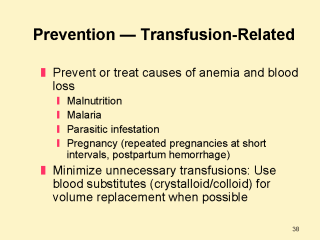 |
Transfusion
of infected blood carries a 95% risk of infecting the patient when a single unit of blood
is transfused. Prevention of HIV transmission through this route should first involve
preventing or treating causes of anemia and blood loss in order to reduce the need for
transfusion. Reducing this need can be done by providing nutritional interventions to
prevent or treat nutritional deficiencies; giving medication to prevent or treat malaria
and parasitic infestations; performing routine active management of the third stage of
labor to minimize the likelihood or severity of postpartum hemorrhage; and encouraging use
of effective contraceptive methods to better space pregnancies and allow better recovery
from anemia related to pregnancy and birth. In many
cases, volume replacement with crystalloid or colloid can reduce the need for transfusion.
|
